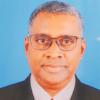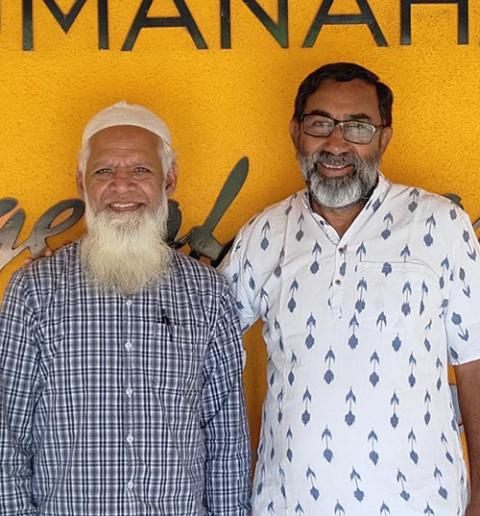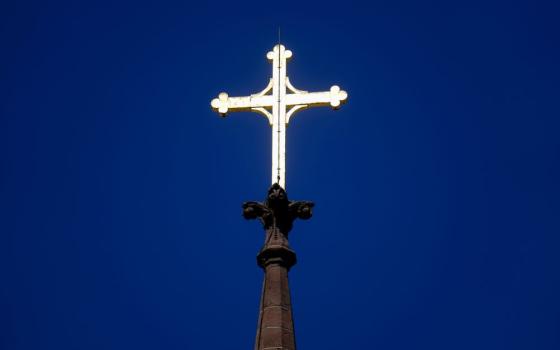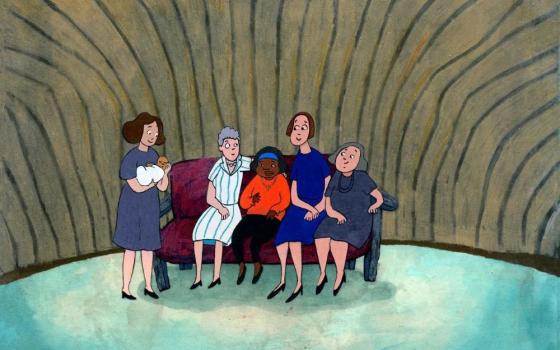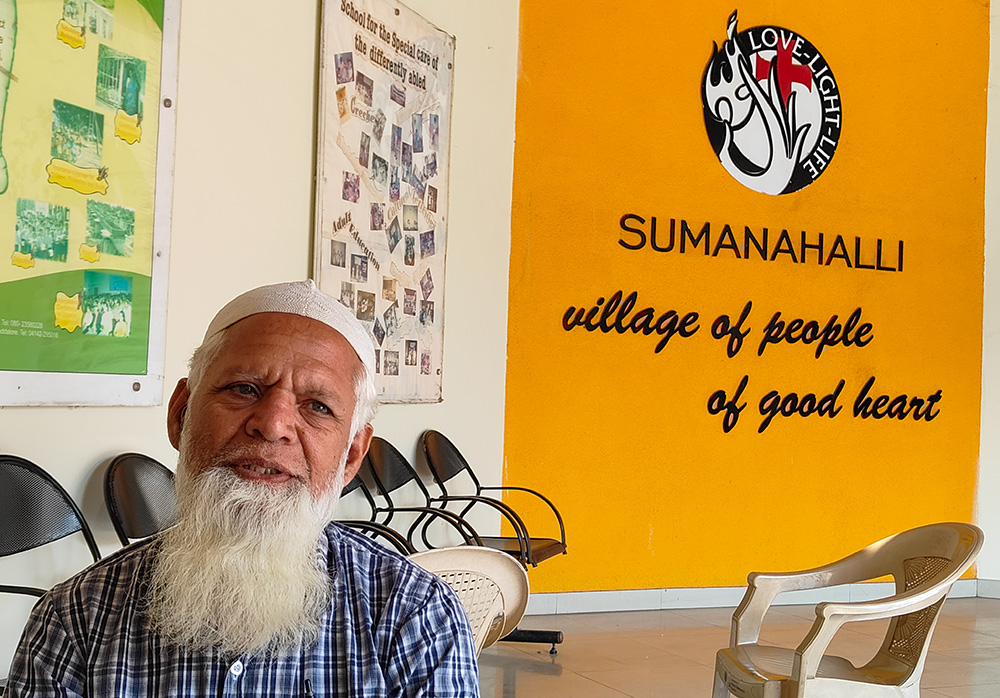
Masthan Sahib, 66, has worked with Catholic nuns for more than 40 years in leprosy treatment, rehabilitation and training in Bengaluru, southern India. (Thomas Scaria)
Masthan Sahib has worked with Catholic nuns for four decades in a leprosy rehabilitation center in Bengaluru, the capital of the southern Indian state of Karnataka.
The center, Sumanahalli, is under the Bangalore Archdiocese, aided by the state government, and managed by nuns and priests of different congregations.
Sahib, a resident of Palamaner, a remote village in the Chittoor district of Andhra Pradesh state, Karnataka's eastern neighbor, was trained by Catholic nuns from overseas to assist their work among leprosy patients.
The 65-year-old Muslim shared with Global Sisters Report how he serves mostly Hindus and Catholic nuns without compromising his faith.
GSR: As a Muslim, how do you feel working with Catholic nuns all these years?
Sahib: I was a Muslim when I joined Sumanahalli 43 years ago, and I remain a Muslim. [He smiled as he smoothed his long white mustache.] The experience gave new dimensions to my faith. Sumanahalli has been my home and village, and the sisters and fathers here are my sisters and brothers.
I believe they are specially chosen by God to serve the least, the lepers and the poor. They do not make me feel I am a Muslim, nor do I see them as Christians. We are the children of the same God and members of the same family.
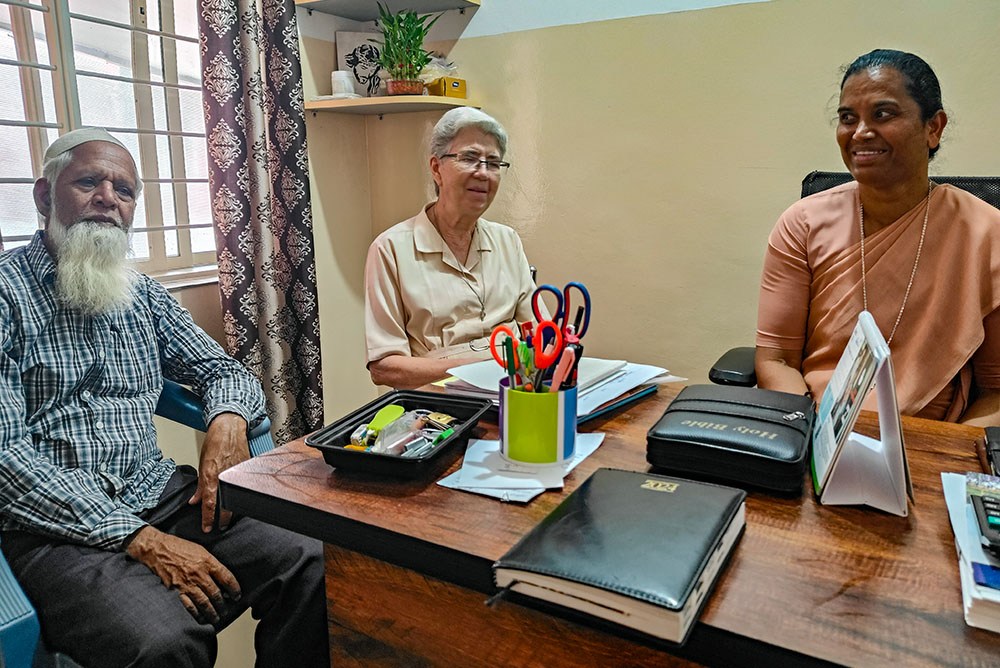
Masthan Sahib with Sr. Maria Rosa (center), a Spanish member of the Franciscan Sisters of the Immaculate, and Sr. Sagaya Rani, superior of their convent in Sumanahalli, a leprosy rehabilitation center in Bengaluru, southern India. (Thomas Scaria)
Tell us about your association with Catholic nuns.
I have worked with five different congregations of sisters. When I joined Sumanahalli, Redemptorist Sr. Givona Lussu, an Italian, was the medical officer, and Montfort Sr. Alicia Rodrigues from America was the coordinator. They interviewed me before appointing me as a paramedical worker.
They were initially apprehensive about my Muslim identity, but later they called me the "face of Sumanahalli." Sisters have come and gone, directors have changed several times, but I remained here. It's because they shaped me as a servant of God.
You say the nuns have transformed you. How?
They formed me as a better human and, above all, a better Muslim. They taught me English and trained me in community surveys, statistics, leprosy identification skills, dressing and multi-drug therapy.
Advertisement
In fact, I learned all this not in theory classes but by observing how the sisters did things. I was impressed with their dedication, commitment, care, love, simplicity, patience and faith in God. It has kept me in this field all these years. Today, I am the training coordinator here.
Do you mean the nuns also influenced your life and faith?
They did not influence my faith but my life. They shaped my life in such a way that I can see the presence of God in everyone and respond accordingly. Once, Sister Alicia told me that she could show me God. I thought she was going to introduce Jesus to me. But she took me to a leprosy patient who had wounds on his legs, hands and face. She told me then, "This is our God."
Initially, I could not understand what she meant. But when I saw her washing and dressing his wounds, even without a glove, I began to experience the depth of what she said. From that day, I started dressing patients and could feel a divine power guiding me, as well.
Why did you choose to work in a leprosy center?
When I was 16, I joined a village hospital as a ward boy near my home and worked there until 1982. Some leprosy patients came there for dressing. One of them was a co-worker of my brother, a government electrician. He told me about Sumanahalli. When I came, I already had some working knowledge about leprosy. I wanted only a job then, but my association with the sisters eventually made me a committed worker in the field.
Please share your earlier days of working with the nuns.
My first duty was accompanying the nuns to slums and villages to identify leprosy cases and provide first aid. We referred them to Sumanahalli. We also had mobile clinics for the patients. Each day, we covered some 300 patients in slums and villages.
I was surprised by the dedication and simplicity of the nuns. Often, the sisters did not wear gloves, saying they would reduce their healing touch. Sometimes, patients abused them, but they just smiled. Their ability to love, care and forgive was amazing.
After the village work, I worked at the center, assisting sisters in dressing patients.
What lessons have you learned from the nuns?
The first lessons I learned from the foreign sisters were punctuality and accountability. I could not reach the workstation on time [because] I stayed 6 miles from the office. The sisters never scolded me but explained how our delay caused problems for patients as they had to go to work after dressing. Since then, I have reported a few minutes before time.
I also imbibed dedication and commitment from the sisters and simplicity, love, care and respect for fellow humans.
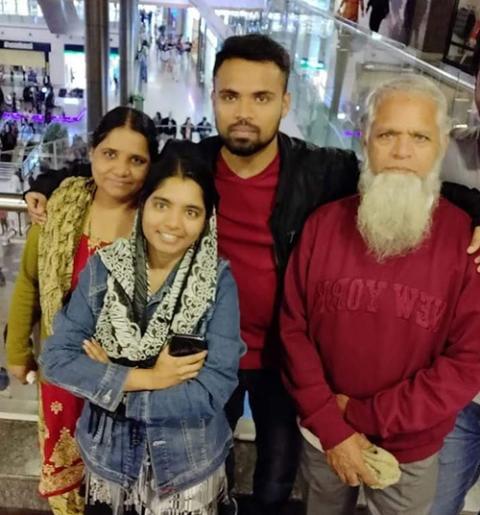
A family photo of Masthan Sahib with his wife, Fahim, and son Jakeer and daughter Sameena (Courtesy of Masthan Sahib)
You said you are the training coordinator in Sumanahalli. Who do you train?
Sumanahalli trains doctors, nurses, community health workers, social work students, sisters and seminarians in treating leprosy patients. Today, more than 60 people from various disciplines attend our theoretical and practical training sessions.
I give the new generation what I learned from the sisters. For almost 30 years, I worked as an all-rounder in Sumanahalli, and then [Claretian] Fr. George Kannanthanam [the current director] gave me the designation of training coordinator.
Can you say something about your family?
My wife, Fahim, is from my village. We have a son and a daughter. My son, Jakeer, is the elder, and he is a chartered accountant. My daughter, Sameena, is also in the same field. Both are married.
Sumanahalli's sisters and priests have blessed us in all important milestones in my life — my marriage and my children's education and marriage. They [also] helped me when my mother died at the age of 104. My wife works with Ashadeep Girls Home, an orphanage of the Daughters of Wisdom.
My daughter learned bharatanatyam [Indian classical dance form] at the National Biblical Catechetical and Liturgical Centre. She has toured all over the world as part of a cultural team that presented the life and message of Jesus Christ. The church and sisters have molded her as a great artist and a powerful missionary without becoming a Christian.
